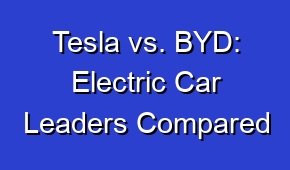The Rise of Electric Cars: Beyond Tesla’s Dominance

The electric vehicle market has been dominated by Tesla for years, but now other automakers are stepping up their game. This article explores the rise of electric vehicles beyond Tesla, highlighting the latest advancements and innovations in the industry.
The rise of electric vehicles has gone beyond just Tesla, with numerous other companies entering the market. As consumers become more conscious of their environmental impact, the demand for electric cars continues to grow. These vehicles offer a sustainable and clean alternative to traditional gasoline-powered cars, reducing greenhouse gas emissions and dependence on fossil fuels. With advancements in technology and infrastructure, the electric vehicle industry is experiencing a rapid expansion. Companies like Nissan, General Motors, and Volkswagen are investing heavily in developing their own electric car models to meet the increasing demand. Additionally, governments around the world are implementing policies and incentives to encourage the adoption of electric vehicles. As a result, the future of transportation is shifting towards a more sustainable and eco-friendly option with the rise of electric vehicles beyond Tesla.
| The rise of electric: Beyond Tesla, other companies are making significant advancements in electric vehicles. |
| Electric vehicles are gaining popularity due to their environmental benefits and cost savings. |
| With advancements in technology, electric cars are becoming more efficient and affordable. |
| Government incentives and regulations are driving the adoption of electric vehicles worldwide. |
| The infrastructure for charging stations is expanding to support the growing demand for electric vehicles. |
- Battery technology is improving, allowing for longer driving ranges in electric vehicles.
- The rise of electric vehicles is reducing our dependence on fossil fuels.
- Electric vehicles offer a quieter and smoother driving experience.
- Companies like Nissan, BMW, and Audi are investing heavily in electric vehicle development.
- The rise of electric vehicles is revolutionizing the automotive industry.
What is the future of electric vehicles?
The future of electric vehicles is promising and holds great potential. As technology continues to advance, we can expect to see improvements in battery efficiency, charging infrastructure, and overall performance of electric vehicles. With the increasing focus on sustainability and reducing carbon emissions, electric vehicles are likely to play a significant role in the transportation industry.
| Increased Adoption | Advancements in Technology | Environmental Benefits |
| Electric vehicles are expected to become more popular in the future as governments and consumers prioritize sustainability. | Ongoing research and development efforts are leading to improvements in battery technology, range, and charging infrastructure. | Electric vehicles produce zero tailpipe emissions, reducing air pollution and greenhouse gas emissions. |
| Government incentives and regulations are encouraging the adoption of electric vehicles. | Wireless charging technology and fast-charging stations are being developed to enhance the convenience and accessibility of charging. | Electric vehicles contribute to a cleaner and healthier environment by reducing dependence on fossil fuels. |
| Increased investment in electric vehicle manufacturing by automakers is driving innovation and cost reduction. | The development of autonomous driving technology in electric vehicles is expected to revolutionize transportation. | Transitioning to electric vehicles can help mitigate climate change and improve air quality in cities. |
How does the rise of electric vehicles impact the environment?
The rise of electric vehicles has a positive impact on the environment. Unlike traditional gasoline-powered cars, electric vehicles produce zero tailpipe emissions, which helps reduce air pollution and greenhouse gas emissions. Additionally, as more renewable energy sources are integrated into the grid, charging electric vehicles with clean energy further reduces their carbon footprint.
- Reduction in greenhouse gas emissions: Electric vehicles produce zero tailpipe emissions, which helps to reduce greenhouse gas emissions that contribute to climate change. As they are powered by electricity, their overall carbon footprint depends on the source of electricity generation.
- Improvement in air quality: Since electric vehicles do not emit pollutants such as nitrogen oxides, particulate matter, and volatile organic compounds, they help to improve air quality and reduce the negative impacts on human health caused by traditional internal combustion engine vehicles.
- Reduction in noise pollution: Electric vehicles are generally quieter compared to traditional vehicles with internal combustion engines. This reduction in noise pollution can have a positive impact on urban environments and human well-being.
What are the advantages of electric vehicles over traditional cars?
Electric vehicles offer several advantages over traditional cars. They are more energy-efficient, as electric motors convert a higher percentage of energy from the battery to power the vehicle compared to internal combustion engines. Electric vehicles also have lower operating costs, as they require less maintenance and have fewer moving parts. Additionally, they provide a smoother and quieter driving experience.
- Lower environmental impact: Electric vehicles produce zero tailpipe emissions, reducing air pollution and greenhouse gas emissions that contribute to climate change.
- Lower operating costs: Electric vehicles have lower fuel costs compared to traditional cars, as electricity is generally cheaper than gasoline or diesel. Additionally, maintenance costs are typically lower, as electric vehicles have fewer moving parts and do not require oil changes.
- Energy efficiency: Electric vehicles convert a higher percentage of energy from the grid to power at the wheels, making them more energy efficient than internal combustion engine vehicles.
- Quiet and smooth ride: Electric vehicles operate quietly, providing a more peaceful driving experience. They also offer instant torque, providing smooth and quick acceleration.
- Government incentives: Many governments offer incentives, such as tax credits or rebates, to encourage the purchase of electric vehicles. These incentives can help offset the higher upfront costs of electric vehicles.
Are there any challenges in the widespread adoption of electric vehicles?
While the adoption of electric vehicles is growing rapidly, there are still some challenges that need to be addressed. One major challenge is the limited availability of charging infrastructure, especially in certain regions or remote areas. Range anxiety, or the fear of running out of battery while driving, is also a concern for some potential buyers. However, efforts are being made to expand charging networks and improve battery technology to overcome these challenges.
| Range Anxiety | Lack of Charging Infrastructure | High Initial Cost |
| Electric vehicles have limited driving range compared to traditional gasoline-powered vehicles, causing concerns about running out of battery power. | The availability and accessibility of charging stations is still limited in many areas, making it inconvenient for EV owners to find charging facilities. | Electric vehicles are generally more expensive than conventional vehicles, mainly due to the high cost of batteries. This can deter potential buyers from adopting EVs. |
| Battery Technology | Long Charging Time | Dependency on Electricity Grid |
| The technology and efficiency of batteries used in electric vehicles is still developing, which affects the overall performance and range of EVs. | The charging time for electric vehicles is longer compared to refueling with gasoline, which can be inconvenient for those who need quick and frequent refueling. | Electric vehicles rely on the electricity grid for charging, which can put strain on the grid infrastructure if there is a high concentration of EVs in an area. |
What role does Tesla play in the rise of electric vehicles?
Tesla has played a significant role in the rise of electric vehicles. As one of the pioneering companies in the industry, Tesla has pushed the boundaries of electric vehicle technology and made them more accessible to the mass market. Tesla’s innovative approach, sleek designs, and long-range capabilities have helped change the perception of electric vehicles and accelerate their adoption worldwide.
Tesla has played a significant role in the rise of electric vehicles, pioneering advanced technology and setting new standards in the industry.
How do electric vehicles contribute to energy independence?
Electric vehicles contribute to energy independence by reducing reliance on fossil fuels. As renewable energy sources such as solar and wind power become more prevalent, charging electric vehicles with clean energy helps decrease dependence on imported oil and promotes domestic energy production. This shift towards electric transportation also enhances national security by reducing vulnerability to oil price fluctuations and geopolitical tensions.
Electric vehicles contribute to energy independence by reducing dependence on fossil fuels and promoting the use of renewable energy sources.
What are the potential economic benefits of the rise of electric vehicles?
The rise of electric vehicles can bring various economic benefits. It creates new job opportunities in manufacturing, research and development, and the installation of charging infrastructure. The transition to electric transportation also reduces spending on imported oil, which can improve a country’s trade balance. Additionally, as the demand for electric vehicles increases, economies of scale can lead to cost reductions, making electric vehicles more affordable for consumers.
Reduced dependence on fossil fuels
Electric vehicles (EVs) are powered by electricity, which can be generated from various renewable sources such as solar, wind, and hydroelectric power. By transitioning to EVs, countries can reduce their dependence on fossil fuels, which are finite resources and contribute to air pollution and climate change. This shift towards renewable energy sources for transportation can lead to a more sustainable and cleaner environment.
Job creation and economic growth
The rise of electric vehicles can create new job opportunities and stimulate economic growth. As the demand for EVs increases, there will be a need for the production of electric vehicle components, batteries, and charging infrastructure. This can lead to the establishment of new manufacturing plants and the expansion of existing ones, resulting in job creation and increased economic activity in the electric vehicle industry.
Cost savings and reduced operating expenses
Electric vehicles have lower operating costs compared to traditional internal combustion engine vehicles. EV owners can benefit from lower fuel costs as electricity prices are generally more stable and less subject to price fluctuations compared to gasoline or diesel. Additionally, EVs require less maintenance since they have fewer moving parts and do not need oil changes. These cost savings can result in increased disposable income for consumers, which can then be spent on other goods and services, boosting the overall economy.





















